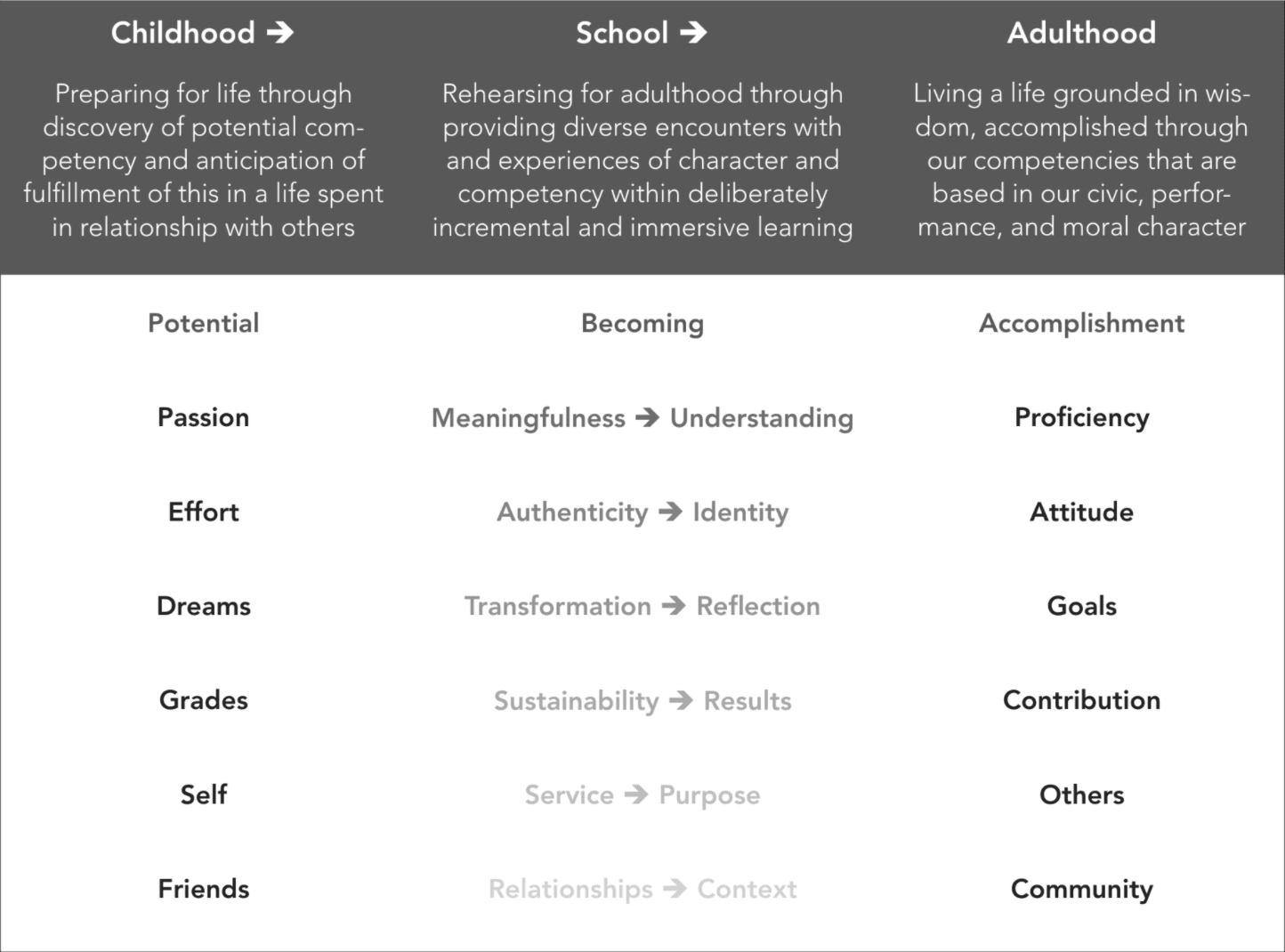The Way | Work | Becoming a School of Character
The Experience Of Schooling
Our map of the experience of schooling must help our students chart the possible journeys to servanthood and the acquisition of 21C character and competency on their quest. We believe that school should be, therefore, a wide field in which we inspire, challenge, and support students to rehearse for their adulthood by providing many diverse encounters with and experiences of competency within deliberately incremental and immersive learning. Like the medieval tales of old and the computer games students play now, the challenges must become harder and more important as the quest goes on.

In this way, the experience of school is about becoming someone else, accompanied as it often is by a reluctance to let go of the child who once was (something which poorly informed and utilised cultures of tradition can unwittingly abet) and the process of gaining expertise through character apprenticeship that shows us where our future might lie. This process sees meaning develop into understanding, authenticity, shape identity, transformation aided by reflection, an emphasis on survival and sustainability progresses towards one which is more concentrated on results, an awareness of service become the generation of true purpose, and immediate relationships giving some ground to the need to appreciate a broader context and a wider world. This journey of becoming is, therefore, also the experience of gaining the mastery of our essential competencies based on civic, performance, and moral character, as well as the attainment of the learning habits of self-efficacy and adaptive expertise required to thrive in 21C.
A good school best meets the expectations of the community which it serves by articulating a resilient and compelling narrative of a school culture driven by its commitment to the total experience of a whole education for desired graduate outcomes based on 21C civic, performance and moral character competencies. This is enhanced further with the development of a shared understanding about how the experience of schooling shapes character. As one school leader explains, “I strive to help the students improve as students, and as people so as to be polite and well-educated citizens ... I strive to live what I teach, and act as a model for my students in terms of behaviour and to maintain a coherence of intention and action. I think that acting as a way of teaching behaviour leaves a more lasting impression on boys ... With real world examples concepts that otherwise might be abstract and vague are suddenly more concrete.” A teacher explains the importance of this sense of being grounded in the real world of learning activity: “When educating boys, in my experience I have found that hands-on, active scenarios whereby the students are ‘learning by doing’ is one of the most effective teaching approaches. I therefore feel that I approach many of our character education sessions with this approach – hands-on and in an environment where the boys are taking part in an activity whether it be role play, creating or making something, or teaching others.”
In many ways, as we have seen, it is the total experience of schooling that provides students with the capacity to learn about what is right and important and subsequently demonstrate this in their emerging adulthood. In this way, it transcends the notion of experiential education as the preserve of a single area of learning (such as outdoor education). It needs to be characteristic of all fields of learning. Another school leader states, “I think it is our purpose as leaders to pass along patience, kindness, and accepting failure, knowing that success will come with time and persistence. With age comes wisdom (I hope) and a perspective that knows young boys with issues, if loved and supported become happy, kind and successful men. It is difficult for parents and younger faculty to have this view. So along with character development within the school curriculum, I find it so important to support and educate families and teachers. The need to understand the value (and model) kindness, patience and persistence will build a strong community.”
The following model of experiential education for 21C character and competency might provide us with a good starting point for understanding the process by which the development of the child and the development of character intertwine:
 A Model of Experiential Education for 21C Character and Competency
A Model of Experiential Education for 21C Character and Competency
This model begins by identifying childhood as a period of preparation for life. Students discover their areas of potential competency and anticipate the fulfilment of this in a life spent in relationships with others. They may resist this compelling imperative along the way – in their adolescence in particular they like their fun and enjoy what is done in the moment. They don’t necessarily want to be told what to do all of the time and many enjoy some mischief along the way. But on the whole, their world of potential is about finding their passions, learning about the necessity of effort, dreaming about possibilities, achieving good (or at least acceptable) grades, exploring their sense of self, and spending time with their friends.
If education should be an experience of growth and, therefore, a process of becoming, then this model shows us how we might take the conventions and artefacts of childhood which are based on potential, and grow them through the schooling experience into an initial expression of adulthood that, over a lifetime, is grounded by wisdom, accomplished through our competencies, and revealed by our civic, performance, and moral character. This, then, might be a worthwhile purpose for any school.






